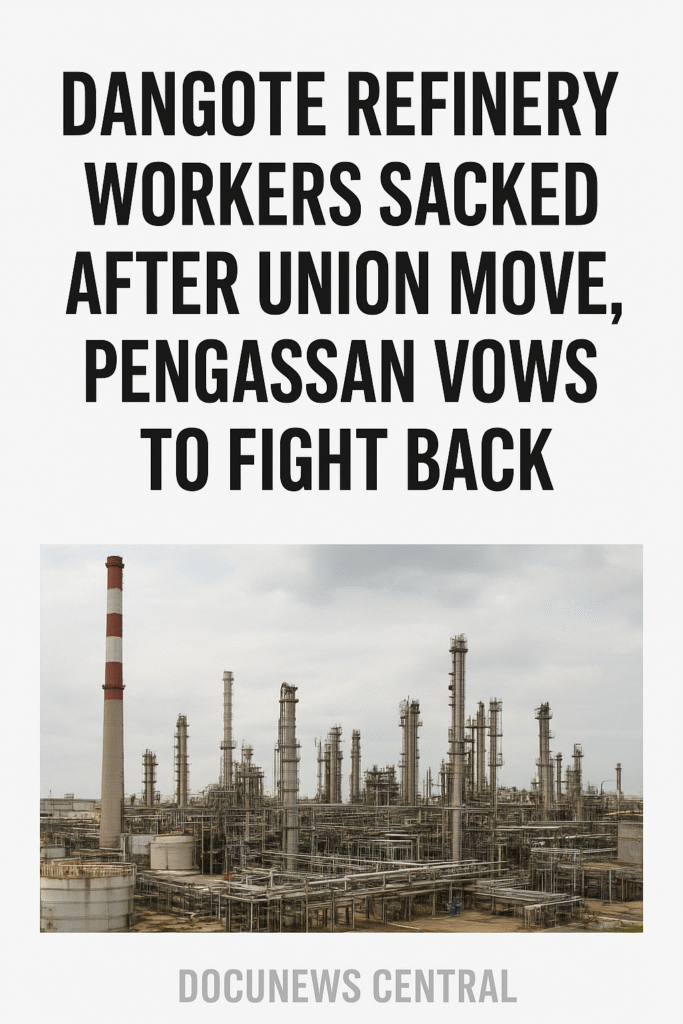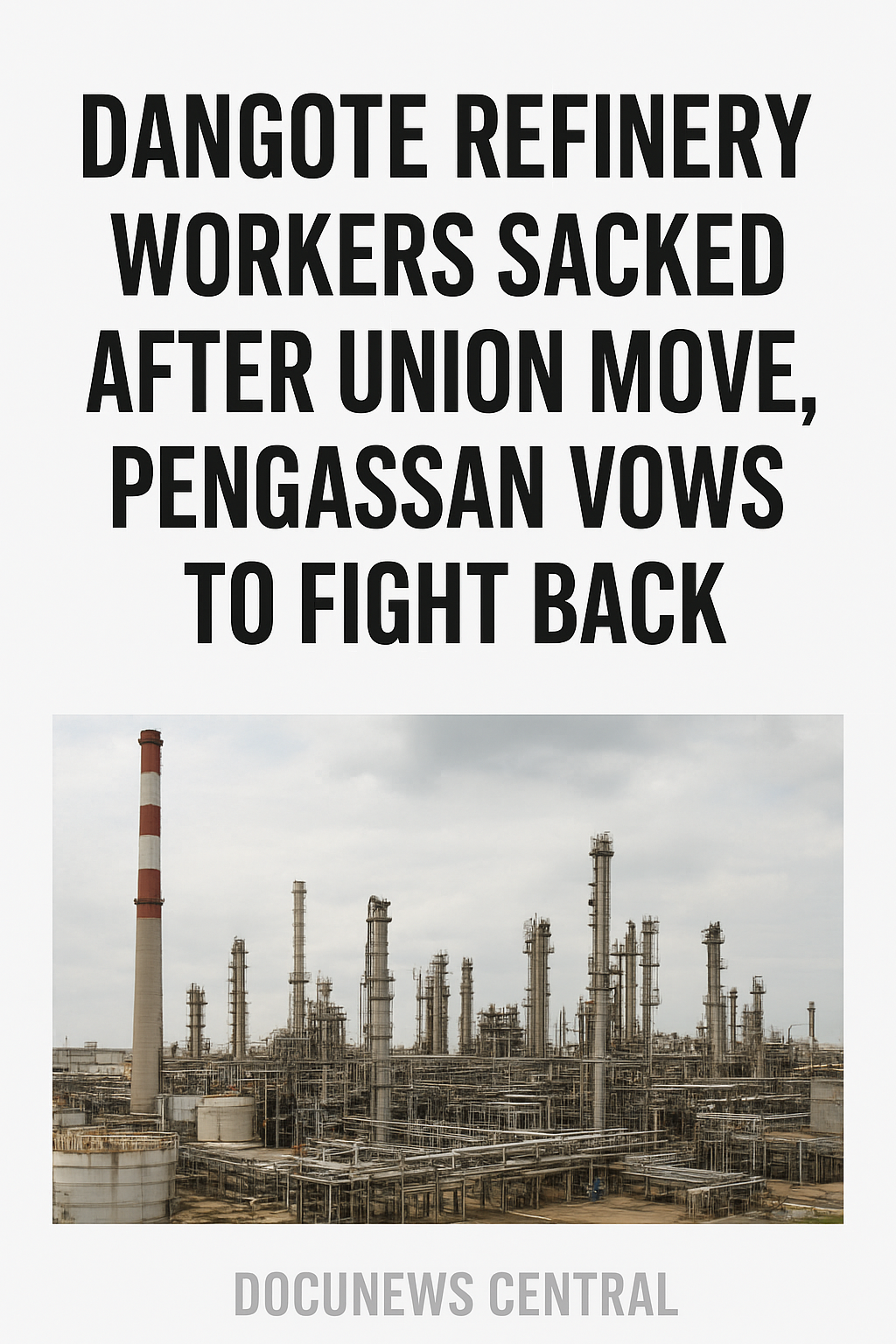
Dangote Refinery Workers Sacked After Union Move, PENGASSAN Vows to Fight Back
Shock At Nigeria’s Largest Oil Refinery
A storm is rocking the Dangote Petroleum Refinery in Lagos State. Reports from union leaders and credible media outlets reveal that the company has fired some of its workers after they joined the Petroleum and Natural Gas Senior Staff Association of Nigeria, known as PENGASSAN. The sudden move has sparked strong protests from the union and raised serious questions about workers’ rights in Nigeria’s biggest private oil project.
The refinery, owned by Africa’s richest man, Aliko Dangote, is a $20 billion mega plant built to end Nigeria’s long-running fuel import problem. It is a key project in the nation’s energy plan. But today it is in the spotlight for reasons far removed from fuel supply.
Union Raises Alarm Over Sudden Sack
On Thursday evening, PENGASSAN leaders said they received urgent calls from workers who were denied access to the refinery. According to the union, these workers had only just registered as members. Less than a day later, they were issued letters of termination.
Festus Osifo, the national president of PENGASSAN, told reporters that the union had seen copies of the disengagement letters. He said the letters stated that the affected workers’ services were no longer required with immediate effect. He described the sack as a “clear case of union victimisation” and vowed that the union would not allow such actions to stand.
Osifo stressed that the union would pursue every legal and industrial means to ensure that the affected workers are reinstated. “We will fight this to the end,” he declared.
Dangote Management Denies Targeting Union Members
In a swift reaction, Dangote Group released a statement to the press denying that the company had embarked on a “mass sack.” The management described the move as part of an internal reorganisation meant to tackle what it called acts of sabotage within the facility.
A senior company official explained that some staff members were disengaged as part of a clean-up exercise to protect refinery operations. He insisted that the action was not related to union membership and that not all Nigerian workers were affected.
According to the company, the refinery remains committed to fair labour practices and will continue to work with recognised unions. The official said, “This is not an attack on the rights of workers. It is a measure to protect the refinery from internal sabotage and ensure smooth operations.”
Confusion Over Number of Workers Affected
There is still uncertainty about how many employees have lost their jobs. Early social media claims suggested that all Nigerian workers were sacked. But credible reports, including a dispatch from Reuters, say only some workers have been dismissed.
Neither the union nor the company has released an official list or figure. PENGASSAN claims that many workers were affected and insists that the timing of the sack — barely 24 hours after they joined the union — proves that the action is linked to union membership.
Dangote Group, on the other hand, maintains that the dismissals were planned as part of a wider restructuring and that the timing is a coincidence.
Union Vows Legal And Industrial Action
PENGASSAN says it will not stop at press statements. The union has vowed to recall the affected workers through every legal means. Osifo said that the union has already begun talks with the Ministry of Labour and other relevant agencies.
He warned that if the management fails to reinstate the workers, PENGASSAN could declare an industrial action that might disrupt operations at the refinery. “We will not allow any company to intimidate workers or to punish them for exercising their right to join a union,” he said.
The union’s stance sets the stage for what could become one of the biggest labour showdowns in Nigeria’s oil and gas sector in recent years.
Labour Rights Under the Spotlight
The incident has reignited debate over the state of labour rights in Nigeria. The country’s labour law clearly protects the right of workers to join unions. Section 40 of the 1999 Constitution guarantees freedom of association, including the right to form or join trade unions for the protection of interests.
Labour experts say if the allegations against Dangote Refinery are proven true, the action could be seen as a violation of both the constitution and international labour conventions to which Nigeria is a signatory.
Human rights groups and labour advocates have already begun to call on the Federal Government to step in. They argue that workers must not be punished for exercising a basic right.
A Key National Project in the Eye of the Storm
The Dangote Petroleum Refinery is not just another private company. It is the single largest oil refining project in Africa, with a stated capacity of 650,000 barrels per day. It was commissioned with high hopes that it would help Nigeria end its decades-long reliance on imported petrol and diesel.
The refinery is also seen as a key driver of job creation and economic growth. Thousands of Nigerian engineers, technicians, and support staff are employed at the facility.
For a project that carries such national significance, the allegations of union victimisation have created widespread concern. Observers say prolonged labour disputes could delay the refinery’s ambitious production schedule and hurt Nigeria’s plan to achieve energy independence.
Mixed Reactions From the Public
Nigerians have taken to social media to share their opinions. Some users accuse Dangote of trying to suppress union activity to maintain absolute control over workers. They argue that no company, no matter how big, should be above the law.
Others believe the company may have valid reasons if there were indeed acts of sabotage. They call for caution and for the public to wait for an independent investigation before drawing conclusions.
Labour leaders across other sectors have also expressed solidarity with PENGASSAN. They warn that if the refinery can get away with such actions, it could set a dangerous precedent for other employers.
Government and Regulators Face Pressure
The Ministry of Labour and Employment has so far not issued a formal statement. But pressure is mounting on the Federal Government to intervene quickly. Analysts say the government cannot afford a prolonged standoff at a facility that is crucial to Nigeria’s energy security.
Some lawmakers have also called for an urgent probe. They argue that protecting the rights of workers while maintaining stability in strategic industries must remain a top priority.
Next Steps and Possible Outcomes
PENGASSAN has vowed to pursue legal action if management does not recall the workers. Possible outcomes include:
Negotiation and settlement – where the company agrees to reinstate the workers and work with the union to prevent future disputes.
Labour court action – where the case is taken to the National Industrial Court for a legal ruling.
Industrial action – a strike that could disrupt operations and draw national attention.
Experts say a quick and fair resolution is in the best interest of both sides and of Nigeria’s economy.
Verdict on the Claims
Based on multiple credible reports, it is true that Dangote Refinery has fired some workers and that PENGASSAN believes the sackings are linked to union membership. The union says the workers were sacked less than 24 hours after joining, and it has vowed to fight for their recall.
However, the claim that all Nigerian workers were sacked is not correct. Reuters and other reliable outlets report that only some workers were affected. Dangote Group firmly denies a mass sack and insists that the action is part of a wider reorganisation to prevent sabotage.
Conclusion
The Dangote Refinery labour dispute is a major test for Nigeria’s labour rights and for one of the country’s most strategic industrial projects.
While PENGASSAN vows to recall the affected workers and Dangote insists it acted only to protect its operations, Nigerians and the international community will be watching closely.
The outcome will shape not only the future of the refinery but also the wider struggle for workers’ rights in Nigeria’s growing private sector.
This breaking story highlights the urgent need for dialogue, transparency, and respect for labour laws. The nation now waits to see if both sides can reach a fair settlement that keeps the refinery running and protects the rights of every worker.











